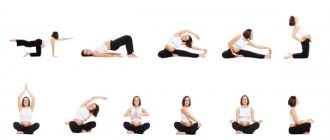Many women lead an active lifestyle and play sports. Even during pregnancy, they do not want to give up the workouts that have already become familiar to them. But responsible women understand that they now carry their baby under their hearts, so they must think not only about themselves, but also about him. Naturally, they wonder whether it is possible to exercise during pregnancy.
A moderate load will “smooth out” phenomena such as toxicosis and dizziness. Despite the fact that in the first trimester you want to sleep and eat, in these cases it is even recommended to move a little.
Who should not exercise during pregnancy?
If you have asthma, heart disease, or diabetes, your doctor may advise you to avoid additional exercise. Contraindications to sports during pregnancy may include:
- bleeding or spotting;
- placenta previa;
- threatened miscarriage or history of involuntary abortion in the past;
- previous premature births;
- weakened cervix.
Before starting a pregnancy exercise program—whether it's yoga, aqua aerobics, or breathing exercises—it's wise to consult with your doctor. Based on your medical history, your doctor can give individual recommendations regarding certain exercises.
Sports for a pregnant woman: what to choose?
It’s worth mentioning right away that doctors identify several indicators under which, despite the desire to exercise, it is prohibited to do so. Early pregnancy and sports are categorically incompatible for the following conditions:
- abnormal development of the uterus;
- threat of miscarriage due to hormonal imbalance (ratio of progesterone and estrogen);
- unfavorable medical history (pre-existing miscarriages or premature births);
- low tone of the cervix and its isthmus (risk of miscarriage);
- bloody discharge from the uterus;
- placenta previa (threat of premature detachment during physical exertion).
Swimming
What sports can you do in the early stages of pregnancy? Despite many disagreements on this issue, traditional medicine clearly gives preference to swimming. The benefits of this type of physical activity:
- training the muscles of the back, abdomen and pelvic floor;
- strengthening the cardiovascular system, which is under increased stress in the condition;
- improvement of blood supply in all organs, prevention of varicose veins;
- Relieving stress from the back and spine, relaxing the body;
- respiratory system training.
We recommend reading the article on water procedures in early pregnancy. From it you will learn about the rules for visiting showers and baths, public swimming pools, as well as trips to the sea.
Fitness
Many women are accustomed to monitoring their physical fitness and do not want to give up their usual exercises. They have many questions: is it possible to squat, bend, spin a hoop, dance in the early stages of pregnancy. If a woman has no health problems, then doctors do not prohibit fitness in the early stages of pregnancy. But classes in general groups have to be reconsidered: limit running, jumping, and abdominal stress. Therefore, it is better to go to a special group and study according to a specially developed program.
Gymnastics
What does gymnastics for pregnant women in the early stages include:
| The whole range of breathing exercises | Allows you to prepare for special breathing during childbirth. In addition, in the last trimester of pregnancy, when the enlarged uterus puts pressure on the diaphragm, the woman's lung capacity decreases. The need for oxygen, on the contrary, increases every month. Breathing exercises allow you to more efficiently use the oxygen entering your lungs. |
| Special exercises to strengthen the abdominal wall | To make labor easier, it is recommended to strengthen the abdominal muscles. It is very good to pump up your abs during pregnancy in the early stages using a fitball. |
| Strengthening your back muscles | Such exercises make it easier to cope with the load on the spine in the last trimester of pregnancy. |
| Strengthening the ankle joints | Prevention of flat feet. |
| Exercises for the pelvic floor muscles | Direct preparation for labor. |
| Relaxing complex | To relieve fatigue in the muscles of the whole body. |
It is prohibited to combine fitness and pregnancy in the early stages in the following cases:
- any chronic disease in a woman;
- pathology of pregnancy;
- fetal pathology.
Ab exercises during pregnancy
It is not recommended to pump up your abs during early pregnancy in the traditional way. But the abdominal muscles are very important for normal pushing activity. Therefore, special exercises have been developed:
- In a standing position, move your heels 40 cm away from the wall. Lean towards the wall, hips flexing. Stay in this position for 5 seconds. The exercise is repeated 10 times.
- Lying on your side, raise your leg 10 cm from the floor, and lower it after 5 seconds. The leg should be straight. The exercise is repeated several times on each leg.
- In a supine position, alternate raising your legs about 20 cm from the floor (scissors with your legs).
- Doctors do not prohibit spinning a hoop. It is important to choose it correctly and not to overdo it.
Exercises in the early stages of pregnancy should be regular so that the body of the woman and baby gets used to the stress. Otherwise it will be unnecessary additional stress.
Dancing
Dancing is physical exercise, only more enjoyable and emotionally intense. There are restrictions on practicing in dance groups during pregnancy and are similar to those for other physical activities. There are special groups where, under the supervision of an experienced trainer, women perform only “useful”, correct dance movements.
It is better to forget discos and nightclubs. A smoky atmosphere and sudden movements only bring harm.
What exercises are safe during pregnancy?
The most useful and safe sports for pregnant women are swimming, walking, exercise bike, special low-impact aerobics (without running or jumping). These options have a low risk of injury, benefit all muscle groups, and can be done right up until delivery.
Most exercises are safe as long as you do them carefully and don't overexert yourself.
Some racquet sports - such as tennis - are generally safe, but your center of gravity may be compromised by sudden movements; In general, it is best to avoid contact sports. You can continue jogging, especially if you have run before, but it is important to know when to stop. In your later months of pregnancy, you may find you prefer exercises that don't require careful balancing or coordination.
The benefits of playing sports while pregnant
In the modern world, every pregnant woman has a chance to try out specialized comprehensive programs developed by leading gynecologists and teachers. By its structure, physical activity during pregnancy is aimed at improving the general well-being of the expectant mother. An important fact will be the development of muscles that will later participate in the birth process, as well as weight control for 9 months.
Previously, doctors recommended constant bed rest and a predominant state of rest for women expecting a new addition to the family. At the moment, the opinion has changed radically. Over the past 40 years, scientific researchers have been able to prove that physical activity during early pregnancy not only cannot have a negative effect on the child, but also increases the performance of pregnant women.
Scientists have been able to prove that sports for women in a moderate position are capable of:
- improve the functioning of the digestive tract;
- normalize metabolism in the body;
- strengthen the immune system;
- stabilize the general condition;
- ensure proper oxygen saturation of the child’s body;
- protect against edema in late pregnancy;
- reduce the number of stretch marks or protect the expectant mother from their appearance;
- charge with positive emotions.
The sports side of a woman’s life will help keep her body in great shape. Parts of the body prepared for labor will more easily endure the process, and a young mother will be able to restore her figure much faster after the birth of her long-awaited child.
What exercises should you avoid during pregnancy?
It makes sense for pregnant women to avoid certain sports and exercises because they can be harmful to their health. Dangerous activities include:
- contact sports: football, volleyball, basketball;
- activities during which you need to actively jump or run;
- full squats, simultaneous lifting of both legs in a lying position, lateral lifts of the torso and other exercises for the abdominal and abdominal muscles;
- bends with straight legs, in which you must reach your big toes with your hands;
- springy movements when stretching;
- standing waist curl exercises;
- prolonged holding of breath during any physical activity;
- sports where there is a high risk of falling (skating and skiing, horse riding);
- any excessive physical activity in hot, humid weather (not necessarily sports - for example, weeding garden beds in the heat after rain);
- vigorous physical activity “until you drop” after long breaks;
- after 16 weeks of pregnancy - any exercises that are performed lying on your back;
- scuba diving.
Is exercise safe for pregnant women?
Physical activity during pregnancy is safe for most women. However, there are some pregnant women who should discuss this issue with their doctor before starting exercise.
A doctor can assess whether exercising during pregnancy is safe for them. This group includes pregnant women with:
- Heart problems.
- Lung disease.
- Vaginal bleeding.
- High blood pressure during pregnancy.
- Premature births and miscarriages in the past.
- Any signs of preterm labor during this pregnancy.
- With a shortened or slightly open cervix, including in the case of sutures or a ring on the cervical canal.
- Placenta previa.
- Signs that the baby is at a shorter term according to ultrasound during this pregnancy.
- In case of multiple pregnancy.
- With poorly controlled diabetes during pregnancy.
- In case of thyroid disease during pregnancy.
- In case of severe anemia development.
- For problems with bones or joints.
- With eating disorders such as anorexia.
Is it possible to drink coffee during pregnancy?
You should also talk to your doctor or midwife before starting any exercise during pregnancy if you:
- You smoke more than 20 cigarettes a day.
- Usually not physically active.
- You are very overweight (have a body mass index over 40).
What should a pregnancy exercise program include?
To maintain overall tone, your exercise program must strengthen and develop your muscles. Always start with a 5-minute warm-up and stretches for the next 5 minutes. Include at least 15 minutes of cardio into your plan. Measure your heart rate when physical activity is at its maximum. At the end of the session, take time for aerobic exercise, gradually slowing down over the last 5-10 minutes. Finish your workouts with gentle stretches.
When playing sports during pregnancy, you should adhere to the following basic rules:
- Wear loose, comfortable clothing and a good, supportive bra.
- Your shoes should be appropriate for the type of exercise. Proper footwear is the best protection against injury.
- Exercise on a flat, hard surface to avoid falls.
- Make sure your diet provides your body with the right amount of energy (calories) based on your physical activity (on average, 300 calories more per day than before pregnancy).
- Do not eat for at least 1 hour before exercising.
- Drink water before, during and after exercise.
- If you perform exercises on the floor, stand up slowly and carefully after finishing to avoid dizziness.
- Never exercise to the point of exhaustion. If you can't speak normally during class, you should probably slow down.
Sports in early pregnancy
important In the first trimester of pregnancy, when all the systems and organs of the unborn baby are being formed, fitness should be approached very carefully. The load when performing any type of exercise can be increased a little later, after the symptoms of toxicosis disappear.
During the first months of pregnancy, when playing sports, you should pay attention to the following recommendations:
- You need to exercise regularly (the best option is three times a week);
- you should start exercising a few hours after eating;
- the body should not be allowed to overheat, since the unborn baby does not yet have its own thermoregulation system;
- It is recommended to perform breathing exercises to help saturate the body with oxygen;
- during the first trimester, cardio exercise is contraindicated, since during this period the load on the pregnant woman’s heart is already increased;
- In case of multiple pregnancy, pain or discomfort in the abdominal area, it is better to avoid performing physical exercises.
additionally If there are contraindications to playing sports, you should not be upset.
Sports during pregnancy can be replaced with regular walks in the fresh air, which will help maintain the body’s activity at a sufficient level.
How will physiological changes in the body during pregnancy affect exercise?
The physiological changes of pregnancy require your body to work hard. Keeping the factors below in mind, try to listen to your body and adjust the load as needed:
- your baby needs energy and oxygen.
- The hormones your body produces during pregnancy weaken and stretch the ligaments. Thus, the joints become loose and the risk of injury increases.
- excess weight and its uneven distribution shift your center of gravity. Excess weight also puts additional stress on your back muscles, joints and pelvic area, increasing the likelihood of losing your balance.
Sports during pregnancy - the benefits of training during pregnancy
Moderate physical activity will have a beneficial effect on the health of the expectant mother and baby.
Regular exercise during pregnancy strengthens the cardiovascular and respiratory systems, normalizes blood pressure, accelerates metabolism and blood and lymph circulation, improves immunity and helps cope with toxicosis.
During training, the blood is saturated with oxygen, the nutrition of the fetus and placenta improves, and swelling goes away.
And activities such as yoga and palites develop body flexibility, train the muscles of the back, legs, abdomen and pelvic floor, preparing the woman’s body for childbirth, reducing the risk of ruptures and injuries.
Also, physical activity will help the expectant mother cope with insomnia, control weight and maintain good physical shape, improve her mood and psycho-emotional state.
The choice of type of load depends on the lifestyle that the expectant mother led before pregnancy. If she has been exercising regularly, she can continue her usual workouts, reducing their intensity.
Pregnancy is not the best time to learn something new.
If you have previously led a sedentary lifestyle, it is better to just walk more in the fresh air, take up swimming or gymnastics for pregnant women - these activities are suitable for any level of physical fitness.
Attention: when to stop
Stop exercising immediately and consult your midwife or doctor if:
- you feel pain in your chest.
- you feel pain in the pelvic area or abdomen; if contractions begin.
- headache begins.
- you notice that the child begins to move less or has stopped moving altogether.
- you feel nauseous, dizzy, or about to faint.
- you are cold and disgusted, despite the workload.
- you have vaginal bleeding.
- your water suddenly started to break.
- your heartbeat has become irregular or intermittent.
- you notice sudden swelling in your ankles, arms, face, or pain in your lower legs.
- you are short of breath.
- you find it difficult to walk.
- you feel weak in your muscles.
How do you know if you can start training?
In some situations, physical activity during pregnancy is not only not contraindicated, but is also recommended by many leading experts. If before the onset of a happy time a woman was professionally involved in sports, exercise in the early stages should become less productive than before.
The lesson program will need to be adjusted in connection with the new situation. In other cases, it is necessary to schedule a consultation with a qualified instructor who is able to develop an individual training program based on the data obtained after the conversation.
How quickly can you resume exercise after giving birth?
It's best to seek advice from your doctor or midwife; it all depends on your individual circumstances.
Even if you really want to get back into shape as quickly as possible, return to your pre-pregnancy exercise routine gradually. Follow your doctor's advice.
For most women, it is quite safe to do light exercise 1-2 weeks after vaginal birth (3-4 weeks after cesarean section). Try to do no more than half of your regular program to begin with. The main thing is not to overdo it.
What loads are allowed?
One of the very first recommendations regarding physical activity will be this: walk more. Pregnant women are advised to take short walks several times a day. At the same time, it is necessary to ensure that her shoes are comfortable and of high quality. Hiking. Among the simple, accessible to every woman, but very effective exercises, absolutely everyone is allowed, regardless of their training and well-being. Of course, an exception may be women who, due to the threat of miscarriage, are prescribed bed rest.
Walking up the stairs is also useful for pregnant women. Try not to use the elevator. And if you live on the lower floors, you can just walk back and forth several times a day. The main condition is to take your time, breathe evenly and calmly, and do not open your mouth.
As for real sports, an important aspect must be taken into account. If you were actively involved in sports before pregnancy, now is the time to slow down and switch to a gentle regime. If you’ve just now decided to get involved with physical activity, then don’t give it your all. Start small and gradually, within reasonable limits, increase the load.
Naturally, the first positions in terms of usefulness and permissibility during pregnancy are swimming, yoga, and special gymnastics for pregnant women. Swimming has a very beneficial effect on both mother and baby. Exercises in water relieve the spine, strengthen the muscles of the back and chest, massage tissues, and improve blood circulation. You will feel the effect (good mood, improved well-being, disappearance of swelling, muscle tone, etc.) after just a few sessions. After training, many pregnant women note that their appetite has improved and even symptoms of toxicosis have disappeared. Swimming is a great way to keep your body in good shape and a great opportunity to get it in order after the baby is born. Swimming eliminates the risk of falling, overheating, dehydration, and excessive stress on the joints. The only points to remember when going to the pool:
- make sure that the water in it is clean;
- do not go diving, however, we wrote about this above.
More on the topic
Is it possible to exercise during pregnancy?
Is it possible to do bodyflexing during pregnancy?
When can you start exercising after giving birth?
Is it possible to exercise while planning a pregnancy?
When can you start exercising after a caesarean section?
Yoga is also a great activity to do while pregnant. Almost all of its varieties are suitable for this, but it’s still better if you do special exercises adapted for pregnant women. This type of yoga will not harm either mother or baby; there are no inverted poses or exercises that must be performed while lying on your back. Another argument in favor of yoga is that when performing the exercises, a lot of time is devoted to breathing and relaxation. This has a very beneficial effect on the development of the baby (proper breathing improves blood circulation and he receives more oxygen), and also prepares the mother for childbirth (at this stage, controlled specific breathing helps ease contractions and feel less pain during expulsion of the fetus). When performing the complex, try to have something nearby that, if necessary, you could lean on. Do not overstretch the ligaments or strain the abdominal wall.
Gymnastics for pregnant women was developed by instructors taking into account the special needs and characteristics of women during the period of bearing children. These exercises are aimed at training the respiratory and cardiovascular systems, the muscles involved in childbirth, strengthening the abdominal and pelvic floor muscles, and aligning posture. This is an excellent exercise for pregnant women, which will make your muscles flexible. As a rule, complexes for pregnant women include Kegel exercises, thanks to which the muscles that are directly involved in the birth process are trained. Agree, the load on the perineal muscles during childbirth is serious. Often, gymnastics for pregnant women involves exercises on a fitball (large inflatable ball). This training is aimed at maintaining and increasing the level of fitness of the cardiovascular system, developing strength and flexibility, reducing back pain, reducing blood pressure, improving blood circulation and overall well-being.
Among other workouts we can mention Pilates. It is not contraindicated for pregnant women. On the contrary, Pilates develops the pelvic floor muscles, which are actively involved in the birth process, and teaches proper breathing. During classes, the blood supply to the fetus improves, which has a very positive effect on the baby’s intrauterine development.
What standard sports are allowed? Well, for example, tennis. However, you should not grab a racket if you have never played tennis before. Save this activity for the postpartum period. But if you have been actively involved in this sport for a long period, then with the onset of pregnancy, you can safely continue training. True, the key word here is “calmly” - no sudden movements, jolts or overheating. If the load is reduced and with the permission of a doctor, tennis can be practiced for up to 4-5 months.
We classify the following sports as “acceptable”. This:
- Running (at a calm pace, in comfortable shoes and clothes; sometimes it is better to switch to brisk walking; control your breathing and general well-being; if you have been jogging before, you can continue it until mid-pregnancy);
- Cycling (allowed with some reservations: the routes must be smooth, safe, you can only do it if you have a lot of experience, choose a “ladies’” bike with a soft, wide saddle);
- Skiing (if you have skiing experience, subject to reduced intensity and with your doctor’s permission, you can practice throughout your pregnancy, but not in high altitudes, since there is a lack of oxygen and a high risk of falls).
What sport is recommended for pregnant women?
Having made sure that a sports orientation while carrying a baby is possible and recommended by experts, expectant mothers begin to think about which direction is best to choose for the near future.
Doctors focus the attention of pregnant women on several well-known sports that are well suited for any period of gestation:
- Swimming lesson. This will be the best method in the fight against excessive stress on the spine and joints. A set of exercises in water strengthens muscle mass, and also allows the body to relax and get rid of tension.
- Special fitness that will prepare the body for the birth process and improve the flexibility of all muscles.
- Yoga or Pilates exercises aimed at stretching, controlling the respiratory process, which is so important during childbirth, and improving the general condition of a woman. Almost all yoga schools teach a course of special classes for expectant mothers; physical exercise during pregnancy will not be a problem in this direction. The doctor whom the expectant mother chooses for consultation regarding sports issues will have to select a feasible load for the body. To do this, he may need ongoing tests and conclusions from specialists in various fields completed in recent months. In the early stages of pregnancy, what is possible and what is not is strictly determined by the doctor; you should not prescribe on your own.
Exercise when detecting health problems
So, we found out that pregnant women are not at all prohibited from playing sports, even in the early stages of pregnancy. What is possible and what is not is determined only by specialists. If the expectant mother suddenly develops problems with the thyroid gland, blood vessels, heart, spine, or too rapid weight gain, then active exercises should be abandoned for a while.
Permission for any type of physical activity in this case can only be given by the doctor observing the pregnancy and the obstetrician-gynecologist.











